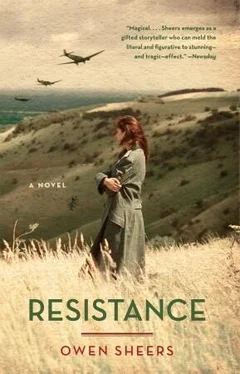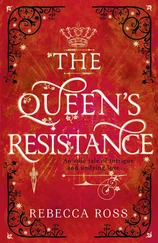Sarah watched Albrecht as he moved slowly about the ruins, running his hand over the flaking sandstone just as he had across the surface of the map. He still wore a pair of grey green uniform trousers, Wehrmacht-issue boots, and an army water bottle on his belt. But from the waist up he was dressed in clothes from The Court; a heavy tweed jacket over a shirt and dark blue jumper. Sarah wondered who the jumper and jacket belonged to. Reg or one of the boys? She thought of Reg’s son Malcolm, dragging his heavy foot over the hill. Leaning back against one of the ruined walls, she let herself slide down its rough surface until she was crouching at its base. How had it come to this? Alone with a German, half-soldier, half-farmer, in the ruins of a house in which she’d played as a child. She’d probably seen those clothes before, when she’d talked with Reg and the boys or watched them at their work just months ago. Maybe that was the very shirt Reg had been wearing last summer when she’d come across the stubbled field with a flagon of cider. When he’d paused in pitching his forkfuls of freshly cut hay onto the wagon to drink thirstily from that flagon, spilling some of it down his front, before handing it back to her with a playful wink and a hoarse, “Thank you, bach.” Perhaps if she got close enough to Albrecht she’d still smell that spilt cider. Still smell another man’s summer on the clothes he wore now.
She looked up at him. The low sun caught the frame of his spectacles. He didn’t look like a soldier anymore, but more like the scholar he said he once was, running his fingers over the remains of this ruined house. His hands looked pale against the dark stone, long-fingered, delicate almost. She was too far away to see the veins branching over the knuckles, but she already knew how blue they were under his pale skin, like mapped rivers under ice.
Tom’s hands were rougher, broader. Other parts of Tom, his smell, his face even, were fading from her, but not his hands. She remembered them. He’d worked with them all his life. Each finger bore the scar of a slipped knife or a barbed-wire nick. Each knuckle held some of the cold and heat of the many seasons he’d worked outside in all weathers. They were heavy, thick hands. When Sarah touched them she used to think he’d only feel her if she dug her nails right in or pressed with all her weight into his palm.
She looked again at Albrecht’s hands. They were hands for turning pages, holding books, for passing slowly over the surface of ancient maps. They were not the hands of a soldier. She couldn’t imagine them holding a gun, a grenade, pulling a trigger. But she knew they must have. She’d seen it for herself that night he came into her house. That night she’d thought he was Tom, back at last, only to see Albrecht standing there, one of his pale hands holding a pistol.
Sarah got up and walked over to where Albrecht was leaning against a corner of the ruin. He was looking down towards the priory as if he wanted to remember its every keystone and fallen arch. She stood behind him, at his shoulder.
“Have you killed people?” she said quietly, speaking as if they were in a crowded room and she wanted no one else to hear them.
Albrecht didn’t move, just let out a brief, almost imperceptible sigh, like an escaped fragment of something larger collapsing within him. His gaze shifted from the priory to a buzzard catching its balance on the morning air in the field below them. “Yes,” he said at last.
“How many?”
“I don’t know.” He watched the buzzard drop then turn a slow glide over the field.
“You wouldn’t think it,” Sarah said. “You’d think t’see it. But you don’t.”
“No,” Albrecht said, “you don’t.”
He pushed himself off the wall and walked along the track that ran away from the ruins, trying to get a better view of the priory below. Sarah followed a few feet behind him until he stopped and sat on a hummock of moss under a tree. Looking down at the ground he tore a few blades of grass from between his feet before looking back up at her standing beside him. “What will you do?” he said. “When this is over?”
“Nothing. Stay here, with Tom.”
Albrecht smiled and nodded his head as if he’d been stupid to ask such an obvious question. “Of course,” he said, “of course you will.” He ripped another handful of grass from between his legs. Sarah came and sat beside him.
“You are a remarkable woman, Sarah.”
The sound of her name in his mouth caught her unawares. She looked up at him but he was staring back down at the priory again. In all the months they’d known each other, they’d never used each other’s names. She had always been Mrs. Lewis and he, whenever she spoke of him to Maggie or the others, was “the captain.” In calling her Sarah it was as if some game they’d been playing was suddenly over. Except she’d never been playing at anything.
“You really believe they’ll come back, don’t you?”
There was no challenge in his voice, just a quiet admiration. Nothing for her to resist or to provoke her anger.
“Yes,” she said. “I do.”
She was lying, but only partly. She didn’t know about the other men, but she did know about Tom. And she did believe he would come back, or at least that he was still here, that he wasn’t dead. She wouldn’t believe that he could die and she wouldn’t know, somehow. A shift in the air about her, a tint upon the light of the day. Somehow, she’d know.
“What about you?” she asked Albrecht. “Will you go home?”
Albrecht followed the buzzard as it made another slow spiralling descent before coming to rest in the upper branches of a tree at the edge of the field. The bird stretched its wings once, then folded them, disappearing to a dark bud, invisible to the passing eye.
“I have no home to go back to,” he said. “I was a student before the war. Always on the move. My parents’ house is no longer there. It was destroyed in an air raid. The same one that killed my fiancée.”
He’d never mentioned Ebbe to Sarah before. She had never wanted to know anything but the barest of facts about his past. “I’m sorry,” she said.
He leant back against the tree. “I was in Russia when they died. I didn’t know until over a month later. For over a month I wrote to all of them, but they were already dead, and I never knew.”
She wanted to reach out and touch him then, but she couldn’t. He was wearing those clothes. To touch them on him would be a betrayal of everything she was holding on to. “Germany, though,” she said eventually. “That’s your home, isn’t it? You’ll be going back there when it’s over, won’t you?”
Albrecht rested his head against the trunk of the tree, closed his eyes, and tilted his face towards the sun rising over the Hatterall ridge behind them. “When I was stationed in Holland,” he said, speaking with his eyes still closed, “I used to go to a park every Sunday to listen to a band that played there. They were very good. I got to know the bandleader. One day I saw a Party official also watching the band. He was holding a clipboard, making marks on it with his pencil. When they were packing up, I asked the bandleader what the official had been doing. He looked at me as if I was mad not to know. ‘Checking we’re playing within the regulations,’ he said. ‘No sideways swaying of the saxophone. No muted trumpet. No ostentatious trills or double-stopping.’ What he meant was nothing that might resemble ‘Negro music,’ as he called it.” Albrecht thought of the distaste on Steiner’s face when they’d tuned through snatches of jazz on the radio. “I am German,” he said, turning his face away from the sun and looking back down at the abandoned priory. “But Germany is not my home anymore.”
Читать дальше












